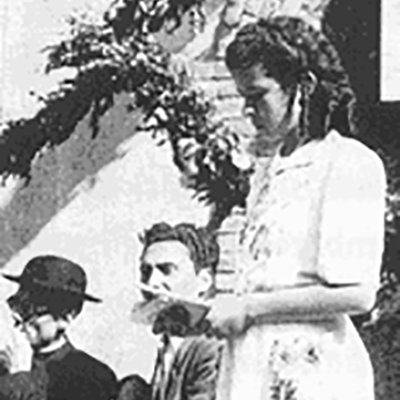It's said...
The writing of Maria Àngels Anglada (Vic, 1930) has become a benchmark of authenticity, among the purest in contemporary Catalan literature. Her voice, which tenderly retains ancient registers of wisdom, has a timbre that sweetly modulates prodigies of art and beauty and, where necessary, sternly hardens at the shadow of injustice.
In "Senyal de peril" (Danger Sign), one of the poems in Arietta, Anglada warns of the risks involved in dealing with poets, while also specifying that she's referring to "poets" and not "court jesters". The kind of danger of which she speaks appears when verses become "scissors of words" for cutting the "ivies of oblivion". Poetry, the intense, honed word, is also the tool that tears open the complicit silences that so often hedge in "a language, a threatened forest or the terrified eyes of my little children in Bosnia".
Vic, 1930 - Figueres, 1999. Novelist, poet and translator
Almost twenty years ago, in the Prologue of Kyparíssia, Jordi Pla referred to this harmonious synthesis between a literature that strives to be the form and expression of beauty and one that never forgets the root of a commitment that turns it into a gaze of solidarity, a gesture of fraternity or a word of denunciation. Commitment and beauty thrive freely throughout the work of Maria Àngels Anglada and the reader can confirm this, even in the short trajectory between the rare aesthetic explosion of a novel like Sandàlies d'escuma (Sandals of Foam, 1985) and the lessons in humanity that flow from the pages of El violí d'Auschwitz (The Violin of Auschwitz, 1995) and Quadern d'Aram (Aram's Notebook, 1997).
With its origins in the Empordà and heart open to Mediterranean hues of blue, Maria Àngels Anglada's literature has never ceased roaming through the intensity of the ancient world, through geographies that endorse what we still are, and through places that have been the cradles of western culture. Her spirit has sought harmonies with the spirit of the classical world and this love relation has borne fruit in her studies, translations and works written for a wide readership, for example the celebrated anthology Les germanes de Safo (Sappho's Sisters, 1983). At the same time, her intense travels over the skins and through the souls of Greece and Italy have burst forth in two beautiful volumes, Paisatge amb poetes (Landscape with Poets, 1988) and Paradís amb poetes (Paradise with Poets, 1993).
Copyright text © Àlbum Maria Àngels Anglada (Centre Català del PEN, 1998)
Many readers wonder what she is like, this frail, reflective and respectful woman of shining, restless gaze, of such a slow, sweet way of speaking. Maria Àngels sees herself as a tenacious person and, on occasions, stubborn. She is understanding, passionate, mysterious, and warm. She values intelligence and goodness in men and women. She appreciates friendship and the understanding of her friends. She's a stalwart of family and friends. She nourishes her close friendships –whether old or new– from Vic, Barcelona and Figueres. She admires real-life heroes who have struggled and who keep struggling, day after day, for human rights. Her dream is a make a very long journey through Greece.
Francesc Foguet i Boreu, M. Àngels Anglada. Passió per la memòria (M. Àngels Anglada. Passion for Memory – Barcelona, Pòrtic, 2003)




